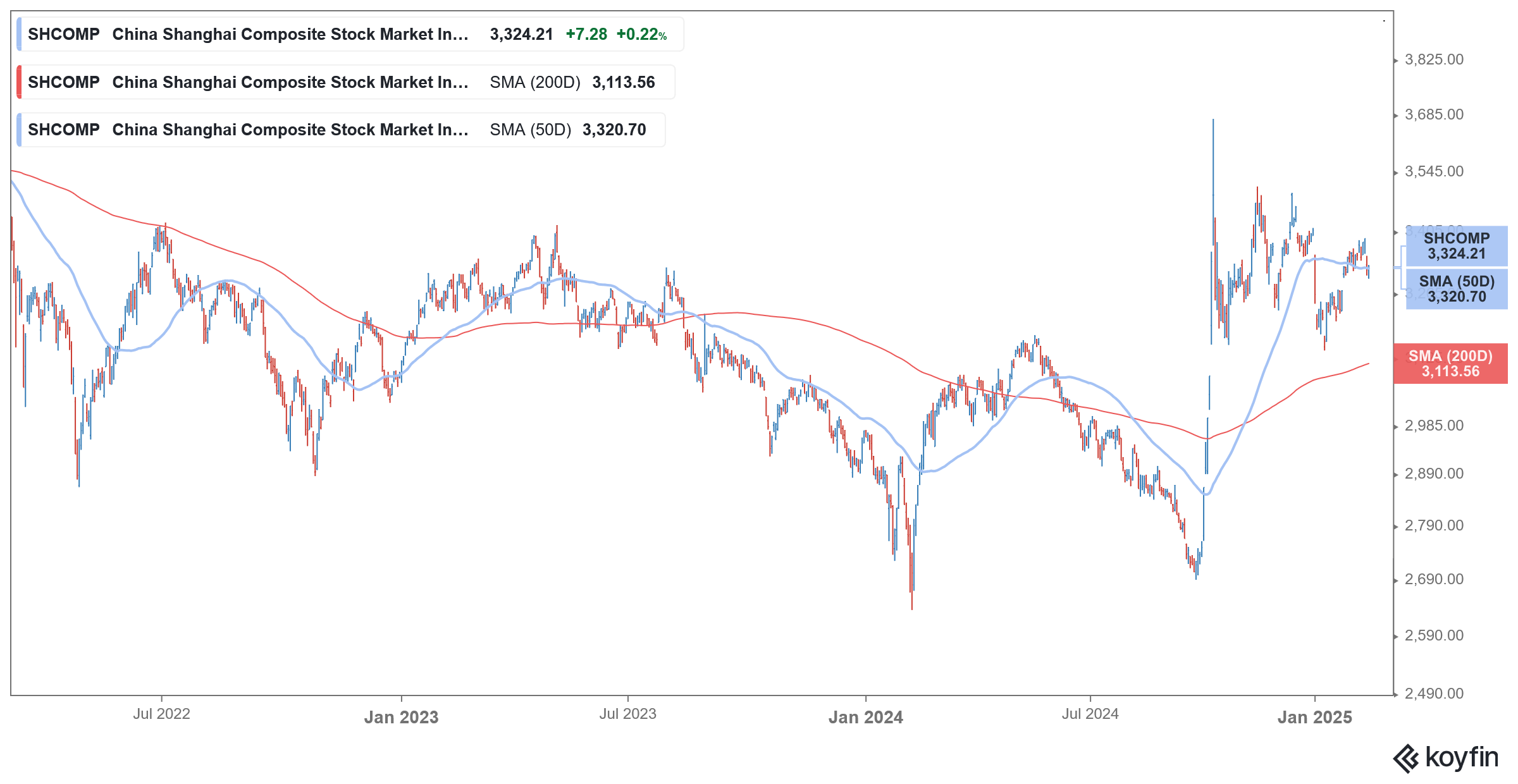China Pledges More Support for Its Economy as It Targets a 5% Growth This Year
Please note that we are not authorised to provide any investment advice. The content on this page is for information purposes only.
China has pledged more support for its economy as the Communist country targets a 5% GDP growth this year which is similar to what it achieved last year. While the country’s GDP growth sagged in the first half of 2024, it announced a bazooka of stimulus measures beginning in September which helped propel growth in the back half of the year.
China took both monetary and fiscal measures to support its economy, which is suffering from structural issues ranging from slow growth in domestic consumption, an aging economy, property market slump, and external risks emanating from tariffs on Chinese exports by several countries, including the US, which is its biggest trading partner.
In his speech at the opening of the annual meeting of the country’s parliament, Chinese Premier Li Qiang, cautioned that “changes unseen in a century are unfolding across the world at a faster pace”. He added, “An increasingly complex and severe external environment may exert a greater impact on China in areas such as trade, science, and technology.”
His comments are a reference to U.S. tariffs and export control restrictions on high-end tech products like AI chips, which the country fears could also be diverted for military use.
China Raised 2025 Fiscal Deficit Target
China raised its 2025 budget deficit target to “around 4%” of GDP which is in line with estimates and 100 basis points higher than the last year. While there are concerns over high debt, last year the country said that it still has much room to raise fiscal deficit.
Notably, China has been taking several measures to improve sentiments and bolster confidence. Last month, Chinese President Xi Jinping met the country’s entrepreneurs including Alibaba’s co-founder Jack Ma at a symposium, which was seen as a sign of support for the country’s tech sector. The meeting was quite notable as Xi cracked down on tech companies including Alibaba in 2020 and 2021 which made Chinese stocks “uninvestible” for many foreign investors.
There has been a renewed interest towards Chinese stocks ever since DeepSeek announced that its artificial intelligence (AI) model that it built for just about $6 million performed better than Western rivals like OpenAI on several parameters.
Xi Jinping Met Chinese Entrepreneurs Last Month
Brokerages have also taken a constructive view of Chinese markets since last year and hailed Xi’s meeting with Chinese entrepreneurs as a step in the right direction.
According to Xinhua, Xi told Chinese entrepreneurs, “It is necessary to resolutely remove all kinds of obstacles to the equal use of production factors and fair participation in market competition.” He added that the country should “continue to promote the fair opening of the competitive field of infrastructure to all kinds of business entities, and continue to make great efforts to solve the problem of difficult and expensive financing for private enterprises.”
Xi stressed, “Now is the perfect time for private enterprises and entrepreneurs to thrive.” He called upon Chinese companies and entrepreneurs to “show their talent” while adding, “The new era and new journey have broad prospects for the development of the private economy and great potential.”
China Retaliates Against US Tariffs
The additional US tariffs on Chinese imports came into effect from yesterday. The world’s second-biggest economy has however vowed to fight back and imposed counter tariffs on imports from the US.
The Chinese embassy in the US tweeted, “If war is what the U.S. wants, be it a tariff war, a trade war or any other type of war, we’re ready to fight till the end.”
Lou Qinjian, spokesperson for the third session of the 14th National People’s Congress, told reporters “We hope to work with the U. S. side to address each other’s concerns through dialogue and consultation on the basis of mutual respect, equality, reciprocity, and mutual betterment.”
He however added, “At the same time, we never accept any act of pressuring or threatening, and will firmly defend our sovereignty, security, and development interests.”
US-China Trade War Escalates
Meanwhile, the escalating trade war between the US and China is hurting companies in both countries. US retailers, ranging from Walmart, Target, and Best Buy, have warned of higher prices from the tariffs.
Moreover, growing US-China tensions are also working to the detriment of US companies operating in China. China is increasingly becoming a tough market for foreign brands like Apple, General Motors, and Starbucks and they have been losing market share to domestic Chinese companies.
Even Tesla’s sales in China plunged by half last month and while there might be other factors at play, China is increasingly becoming a tough market for US companies as consumers are preferring domestic brands.
The trade war is expected to take a toll on the Chinese economy also which is still heavily reliant on exports despite measures to make it a domestic consumption driven economy.
Would the Chinese GDP Rise by 5% in 2025?
Meanwhile, some doubt that the Chinese economy can grow by 5% this year in light of the multiple headwinds and David Kuo, co-founder of The Smart Investor termed that target as a “fantasy.”
“From what I understand about economics, an economy grows through consumer spending … private sector spending, government spending and exports [but] if you have a look at those four levers or drivers, consumer spending is non-existent,” said Kuo, speaking with CNBC.
Most analysts however expect China to ramp up support for its economy through the course of the year as the country navigates challenges on both the domestic and international fronts.






